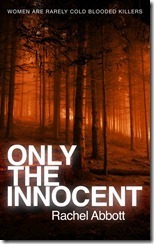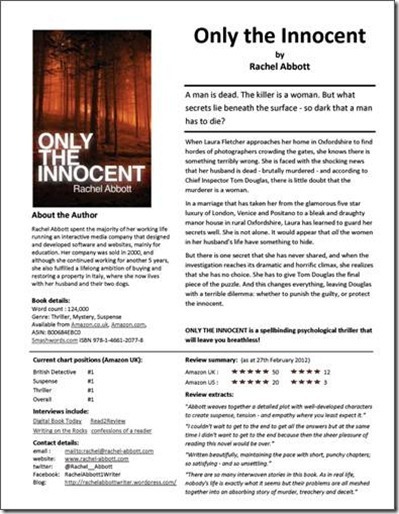Elizabeth Spann Craig's Blog, page 182
March 8, 2012
Letting the Story Come to You—by Shelly Frome
by Shelly Frome, @shellyFrome
![Twinning_final3 copy[2]](https://i.gr-assets.com/images/S/compressed.photo.goodreads.com/hostedimages/1387038866i/7515976.jpg) There was an instructor at a prestigious college program in the Midwest who always gave this advice. Never try to write a novel. Rather, try not to write. And if the time ever comes when you can't help yourself, when you wake up in the middle of night because the prospect of some journey keeps calling you, at that point you've got to get on with it and see it through.
There was an instructor at a prestigious college program in the Midwest who always gave this advice. Never try to write a novel. Rather, try not to write. And if the time ever comes when you can't help yourself, when you wake up in the middle of night because the prospect of some journey keeps calling you, at that point you've got to get on with it and see it through.
In a way, that's the sort of thing that happens to me. As a case in point, I never set out to write a southern gothic crime-and-blues odyssey. I never even knew such a thing existed. It all started when a friend of ours invited us down to the hill country of Mississippi. As it happens, he'd inherited a backwoods cabin and was in the process of fixing it up. At one point, he suggested that he and I take an exploratory walk. Following a narrow overgrown path, soon we became entangled in briars, edged past some barbed wire as the terrain sloped down and eventually came across some waterlogged broken limbs sticking out like menacing pitchforks. Fearing that perhaps we'd gotten lost, I turned to him and said, "Bob, do you have any idea where we are?"
He gave me a half-wary half-mischievous look and said, "Shelly, I believe this here is Wolf Creek."
Then and there something began to percolate. Nothing tangible. Perhaps just a feeling that there were buried secrets here that would never see the light of day.
When we did manage to make it back, something about the cabin in the deep woods evoked a vague image of a Confederate outpost, and then a retreat during the civil rights movement, and then an equally vague notion of a caretaker for whom time was telescoped. That is, for him almost simultaneously it was the days of skirmishes with Yankee troops, Federal marshals at Ole Miss, and an abiding anxiety about Washington inflicting more and more liberal mandates.
But again, these were just hazy notions as my wife and I were taking in the backwoods, the cozy confines of Oxford and Ole Miss, the edges of the Delta and, later on, the blues Mecca of Beale Street in Memphis. But every time I happened to mention the Civil War, I was told it was "The war of Yankee aggression."
Seemingly unconnected at the time, my wife wanted to give some money to a homeless shelter back home. But after we were taken on a tour, I began to notice an abandoned boxcar and railroad line diagonally across the street. I was told down-and-out drifters would hole up there until the weather got really bad. They didn't mind getting vouchers from the shelter, but they'd be damned if they were going to have to comply with any rules, let alone bed down within the confines of the building.
Later still, other factors came into play, like the downturn in the economy and memories of the long-lost pull of the open road.
There was also an unresolved personal element. When I was just a kid, we moved from a tiny town in Massachusetts to Miami where I found most of my teachers and many of my fellow students had southern accents and a deep allegiance to the South. Which side was I on? Choose or keep riding the fence.
To make the proverbial long story short, it was doubtless the unresolved issue with the South and the imagined unfinished buried secrets back in Wolf Creek that did the trick. What finally emerged after more vital characters came into the picture and I allowed the dynamic to play itself out turned out to be my latest. The title that came to me with very little effort was Twilight of the Drifter.
I suppose I should mention one last thing. I am an incurable daydreamer and storyteller.
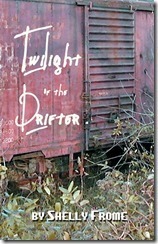 Shelly Frome is a member of Mystery Writers of America, a professor of dramatic arts emeritus at the University of Connecticut, a former professional actor, a writer of mysteries, books on theater and film, and articles on the performing arts appearing in a number of periodicals in the U.S. and the U.K.. His fiction includes Tinseltown Riff, Lilac Moon, Sun Dance for Andy Horn and the trans-Atlantic cozy The Twinning Murders. Among his works of non-fiction are the acclaimed The Actors Studio and texts on the art and craft of screenwriting and writing for the stage. His latest novel is that selfsame southern gothic crime-and-blues odyssey Twilight of the Drifter. He lives in Litchfield, Connecticut.
Shelly Frome is a member of Mystery Writers of America, a professor of dramatic arts emeritus at the University of Connecticut, a former professional actor, a writer of mysteries, books on theater and film, and articles on the performing arts appearing in a number of periodicals in the U.S. and the U.K.. His fiction includes Tinseltown Riff, Lilac Moon, Sun Dance for Andy Horn and the trans-Atlantic cozy The Twinning Murders. Among his works of non-fiction are the acclaimed The Actors Studio and texts on the art and craft of screenwriting and writing for the stage. His latest novel is that selfsame southern gothic crime-and-blues odyssey Twilight of the Drifter. He lives in Litchfield, Connecticut.
March 7, 2012
The Problem With Updating Your Backlist
by Elizabeth S. Craig, @elizabethscraig
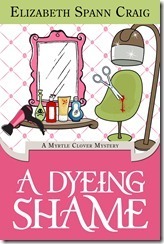 Last year I put out an ebook, myself. When I saw that book produced strong sales, I started immediately looking for other things I could put up online. :)
Last year I put out an ebook, myself. When I saw that book produced strong sales, I started immediately looking for other things I could put up online. :)
I decided to re-release A Dyeing Shame as an ebook. I'd written the book circa 2002-2003ish and it had first released in 2005.
I reread the book and winced a lot. The protagonist had definitely evolved during the next couple of books. And I didn't feel like my writing was nearly at the level that it currently is.
I decided to edit the book. Heavily.
This ended up actually becoming a rewrite…a major revision.
Not only did I add some characters to the book, an important subplot, change some names, and mess with the plot points, but I also added to the book's length.
Oh, and one more important thing.
I rewrote the book as a sequel, instead of keeping it as the first book in the series.
I'd done this because my current readers were familiar with several regular characters in the series. These characters weren't in that first book. I included the characters in my rewrite and picked up the action from the last of the Myrtle books at that point, Progressive Dinner Deadly.
It took me absolutely forever to clean that book up. It took me a lot longer than it took me to write a book from scratch. I finally finished it up with great relief, got it packaged, and published it. It was much better than the previous version.
A couple of months later (December/Januaryish), I started getting emails from readers…people who'd read the first book in 2005 and were confused about the book order. Was this a different book than they'd read years ago?
I also got emails from readers who'd read the new edition of the ebook and were confused about the listed order of the books on websites for mystery readers.
One email said that she'd seen on a website (Stop, You're Killing Me, which is a very popular site with mystery readers) that A Dyeing Shame was listed as the first book in the series with Pretty is as Pretty Dies as the sequel. She said that she just finished reading both and that she could tell that Dyeing Shame was a sequel, not the first book in the series.
And readers can be funny about reading a series in order. I try hard to write my books as standalones, but the problem happens when you introduce new characters. I'd introduced two new, regular characters in Pretty is as Pretty Dies. Because these characters were also in a book that was listed as a prequel to that book, it confused readers.
So, what to do?
Here are my thoughts on it, but I'm curious to hear yours:
If you radically revise a book and put it out as an ebook, consider putting (revised) or (2012 edition) in the subtitle or listed somewhere in the book description…somewhere that information will show up to a buyer.
If you decide to make an older book a sequel to your more recently released books, consider sharing that information on your website or share it with websites that list book order.
Because readers are paying attention! More, I think, than I might be. :)
Have you got any ideas to share on publishing radically revised backlist books? As a reader, do you like reading books in order?
I'm also over at writer Rachel Abbott's blog today, talking about the Writer's Knowledge Base. If you have a chance, hope you'll pop over.
March 4, 2012
Indie Authors—Getting Those All-Important Reviews—by Rachel Abbott
How important are reviews?
The short answer to this questions is VERY. As a writer, it's great to know what your readers think, but as a buyer of books and a reader, it is often a critical part of the decision making process. Get a high level of good reviews, and people believe that your book is worth buying. No reviews, and they may just wait a while.
But you're a new author! You've just published your book, and you have no reviews (except, perhaps, for one from your mum!). What can you do about it? Once your book is selling, the reviews will come - but it seems like a vicious circle, doesn't it? People won't buy if there are no reviews, and if people don't buy, you won't get any reviews.
There is only one answer, and that is put in a bit of hard work and find people to review your book for you. There are literally thousands of websites and blogs where people offer to review books (I read somewhere that there are 15 million book blogs - I can't actually verify this fact!). The trick is in finding the sites that will review your type of book. And you don't have to pay for reviews, although there are some sites that offer reviews in return for money. But it really isn't necessary, so don't panic if you don't have a marketing budget.
There are three phases to this activity.
PHASE 1 - Prepare a really good review request document
This is one of the most important pieces of paper you will ever create, so make it look good. The worst review request that I ever received was an email that said :
Review request
Name of book (hyperlinked to Amazon)
Thanks
Name of author
That was it. So anything that I wanted to know about the book in order to decide if it was one that I felt qualified to review or in fact wanted to review, I had to find out for myself. I asked for more information, and I got no response. I think this is extremely rude.
Then there are the written requests that are full of typos, with no thought to formatting or the ease of reading by the reviewer. I already have an opinion of this author before I start to read!
So the first thing you need to do is to put together a professional document - you only have to do it once, with maybe a few amendments as things change. If you have the facilities to save it as a PDF, that's even better, but if not it's best saved as a .doc file, rather than .docx to avoid having to resend if somebody can't open it.
Here's what you need to tell the reviewer.
Name of book
Author
Book blurb
Image of the cover
About the author
Book details, to include : genre, word count, ISBN or ASIN, where to buy it - with links
Your details, to include : email address, Twitter handle, website, Facebook, blog, etc. - all with links
Additional information: extracts from any existing reviews, number of stars, any interviews you may have done (with links) - anything that might be of interest to the reviewer.
Here's what my review request looks like:
href="http://lh6.ggpht.com/-m-SDARJOpZY/T1N...
I know that this may be hard to read, but if you click here, it will open up a PDF.
I'm not suggesting that this is the best, or the only format - but hopefully it will provide some ideas. And I do know that on more than one occasion I have been accepted by reviewers who were 'closed for reviews' simply because it looks professional and they assumed before starting that my book would be good.
I also use the same document when I am requesting an interview on a blog.
PHASE 2 : finding the reviewers
This is the bit that takes the time, but Google is pretty impressive at finding this sort of information! And I recently came across an incredibly helpful author who has produced a huge list of sites where reviews are offered. He has very kindly put the list on his website at http://www.gregscowen.com/2012/02/a-few-indie-book-reviewers/ - I'm sure he'd be happy if you check out his book whilst visiting the site too! He deserves some kudos for offering all his hard work to the rest of the indie author population!
But don't just send requests to anybody and everybody. Most of these people have quite strict submission guidelines - they will be clear about the genres that they are interested in, and about the way in which they operate. Although I am very clear about what I read and review, it doesn't seem to stop people sending me just anything - whether it's appropriate or not. So check what the reviewer has to say, and if you like the look of them, then construct a carefully worded email, and accompany that with your review request.
Your email should be brief - all the information is in your review request document and you don't need to repeat it. You simply need to say where you found their details, how much you would like them to review your book, and that you have attached a formal review request for their consideration.
You can end this by saying that should they decide to review your book, you would be happy to send them a mobi, epub, paperback - whatever formats you have. Some will be very specific in their requirements. For example, I say that I will accept mobi versions. So if somebody offers me a Word document or a PDF, that's just another email that I have to send saying "no".
It's very important that you keep a note of people that you've asked to review your book. They don't want to receive a second request - and you need to follow it up if you don't get a response. If it comes to that (which is rarely the case) you simply need to say that you requested a review, and wondered if they have considered it. Give them a week or so to decide - don't follow it up the next day.
PHASE 3 - sending the book
This sounds like the easy bit - but there are a few things that can be irritating to reviewers. If they are only going to review on Amazon, then it's not an issue. They should already have the link via your PDF (make sure they are active links!). But if they want to post a review on their blog, you need to have a little pack of materials to send to them.
As soon as they inform you that they would like to review your book, you need to send them :
- an email to say "thank you" and to explain what you are attaching
- an attached copy of the book in whatever format they have requested, or you have agreed (unless, of course, it's a paperback)
- a photo of you
- a jpeg of your book cover
- a list of links to where people can buy the book
- a list of your online contacts - twitter, website, blog etc.
Explain in the email that you don't know what - if any - additional information they require, but you have sent them everything that you think they may need. What you are doing, in fact, is making it easy for them when the time comes to write your review. If you have only sent the book, they have to do all the work by cutting and pasting from Amazon. If they don't feel like it, they may write the review, but without an image of the book cover, without links to where to buy the book, and without any way really of turning this review into a potential sales channel.
There is, of course, a phase 4. It's called sitting and waiting. It could be months - literally - before you hear back. It's not a good idea to chase! I personally wouldn't mind being chased after, say, two months. But not before. Some reviewers wouldn't like it even then, and I have never chased a review.
And then - when the review is posted - the last thing you have to do is write and say thank you. Even if you hate the review, you still need to say thank you.
But it's worth the effort. Enjoy it - you get to meet some really good people and if they like your book, they will talk about it. And that's what you want.
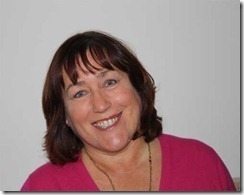 Rachel Abbott is the author of "Only the Innocent" - currently the number one book in the UK Kindle Store. As an indie author herself, she is now blogging and writing guest posts about her experience, with the intention of helping other indie authors to maximize their chance of success.
Rachel Abbott is the author of "Only the Innocent" - currently the number one book in the UK Kindle Store. As an indie author herself, she is now blogging and writing guest posts about her experience, with the intention of helping other indie authors to maximize their chance of success.
March 3, 2012
Twitterific
by Elizabeth S. Craig, @elizabethscraig
![[twitter_newbird_boxed_blueonwhite%255B96%255D.png]](https://i.gr-assets.com/images/S/compressed.photo.goodreads.com/hostedimages/1385561704i/7175578.png) Below are the writing-related links I tweeted last week.
Below are the writing-related links I tweeted last week.
The free Writer's Knowledge Base search engine, designed by software engineer and writer Mike Fleming, makes all these links (now over 14,000) searchable. The WKB recently celebrated its one-year anniversary. 
Sign up for the free monthly WKB newsletter for the web's best links and interviews:http://bit.ly/gx7hg1
What makes a good-looking ebook: Tips on ebook design for standard titles: http://bit.ly/z6j3kR @thefuturebook
How to Revise for Structure: http://bit.ly/A3tQui @jamigold
6 Interior Design Tips to Make Your Blog User-friendly: http://bit.ly/xcN3JF @bobwp
10 Types of Rotten Writing Advice: http://bit.ly/yO2WZE
Worldbuilding--making a city work: http://bit.ly/zRL4qr @JulietteWade
Is the publishing industry ready for change? http://bit.ly/xtJzZb @rachellegardner
Dos and Don'ts for Introducing Your Protagonist: http://bit.ly/y5uHnc @annerallen
Blogging for writers - make your blog work: http://bit.ly/xVlVmK @nicolamorgan
Fact or Fiction? The Entirely True Saga of A Woman Torn Between Two Genres: http://bit.ly/AFvSgS @BTMargins
In Support of "New Adult Fiction": http://bit.ly/yPEiEf @WriteAngleBlog
Writers Conferences--Your Elevator Pitch: http://bit.ly/Arzpmj @Bob_Mayer
Adapting to Create Success: http://bit.ly/wLhdUs @4kidlit
Using canned responses in Gmail: http://bit.ly/yzn0SS @alexisgrant
10 Questions to Ask When Offered Representation: http://bit.ly/w76m8i @Kid_Lit
The Crucial Story Arc: http://bit.ly/y79VWI
Children's Books Defined: http://bit.ly/xSQxO4
2 Ways to Make the Most of Goodreads: http://bit.ly/xvmDrm @JaneFriedman
The Future of Big Publishing in the New Paradigm: http://bit.ly/wd21pt @KristenLamb
Applying screenwriting structure to novels: http://bit.ly/yCvaNC
Religion in Fantasy: http://bit.ly/AzvxP5 @fantasyfaction
Avoiding the Dreaded Infodump: http://bit.ly/xmJYUF @Janice_Hardy
How to fall in love with writing again: http://bit.ly/zOnldF @originalimpulse for @ollinmorales
Tips for writing historical fiction & a list of its subgenres: http://bit.ly/w45ab0 @MarciaARichards for @nicolebasaraba
How to make the most of school visits: http://bit.ly/AnB6JG
Does Your Story Have Too Many Characters? http://bit.ly/zWftdf @KMWeiland
The 5 Point Finale: http://bit.ly/w5Zkcf @sierragodfrey
How (Not) to Write the Perfect Query Letter: http://bit.ly/ywguUL @Ava_Jae
The Power of Symbolism: http://bit.ly/wm9dZ2 @storyfix
Research before you make claims in your queries: http://bit.ly/zC0pfy @behlerpublish
3 Vital Keys to a Good Book Trailer: http://bit.ly/AmM4os @Beth_Barany
Curing Author Ignorance: http://bit.ly/wjYSKj @Porter_Anderson
Tips and highlights for the upcoming AWP conference: http://bit.ly/xxWsZ8 @Porter_Anderson @DanBlank
7 Powerful Ways to End Your Next Blog Post: http://bit.ly/AgLkp7 @aliventures
An agent on "letting projects marinate": http://bit.ly/xA8P9b @greyhausagency
Are You Making These 7 Mistakes with Your About Page? http://bit.ly/xtsSvu @copyblogger
The Changing Face of SFF: http://bit.ly/wXKpUG @fantasyfaction
Thoughts on appropriate ebook pricing: http://bit.ly/AEdC0K @zoewinters
Competence is hot: http://bit.ly/xJ39uN @SF_Novelists
29 Soundbites On Writing And Publishing: http://bit.ly/ztoasf @thecreativepenn
A look at Book Tango: http://bit.ly/xzKhLv @victoriastrauss
The life of a literary agent's assistant: http://bit.ly/y66MLI
Editing to Life – Characterization: http://bit.ly/zp5AmP @lydia_sharp
Need Voice? Think Out Loud: http://bit.ly/yb42Yz @JamiGold
Riveting Our Readers By Using the Death Factor: http://bit.ly/x26UIl @jodyhedlund
How to create suspense: http://bit.ly/Af7JfJ @jammer0501
Music Lessons (that work for publishing, too): http://bit.ly/yrWPYq @ProjectDomino
3 Character Archetypes in Fiction: http://bit.ly/AaUAXP @write_practice for @KMWeiland
6 Tips to Make the Most Out of Writing Workshops: http://bit.ly/zGN3FX
Querying your unlikeable character: http://bit.ly/xW5guK @querytracker
Elements of a good narrative arc: http://bit.ly/AsVZG0 @WriterSherry
5 Ways to Create Memorable, Multi-Layered Characters: http://bit.ly/yhM7ly @jeanoram
Markets & Manners: Tips for Writers: http://bit.ly/wb2RYY
There's Never Been a Better Time to Be a Reader: http://bit.ly/w8pHEZ @readingape
Why Writers Must Be Readers First: http://bit.ly/zSTWXi @Diymfa
The importance of using specific verbs: http://bit.ly/zxmB64 @AimeeLSalter
Don't Write a Book Without a Buyer: http://bit.ly/AknbHq @writersdigest
List of Superhero Origin Stories: http://bit.ly/AicTBy
A word to keep in mind when writing your screenplay: http://bit.ly/zqVTN0 @misfitsandmascara
10 Myths About Editors: http://bit.ly/AxGSno @theresa_stevens
Editing Technique: Lists: http://bit.ly/wjqaVV @Ava_Jae
Use A Hollywood Trick To Plan Your Next Novel: http://bit.ly/A4U8pp
Focus—What's This Story About? http://bit.ly/yMgyb0 @noveleditor
Book Promotion Basics — Useful Articles for New Authors: http://bit.ly/xTUB7n @goblinwriter
An agent on the different levels of middle grade: http://bit.ly/wb8FYp
How to Stop Procrastinating and Start Writing: http://bit.ly/wReXlq @thecreativepenn
Reasons for a Trade Paper Edition: http://bit.ly/xSN0lH @deanwesleysmith
Voice in 3rd Person: http://bit.ly/wI3Ckb @janice_hardy
12 Dos and Don'ts for Author-Bloggers: http://bit.ly/z88Qsd @annerallen
Take Your Characters to Therapy: http://bit.ly/yYFtiO
5 Reasons It's Less Dramatic That Greedo Shot First: http://bit.ly/AnzJhs
The Authors Guild – Providing Blogging Opportunities for the Clueless: http://bit.ly/zHN3v1 @PassiveVoiceBlg
21 Ray Bradbury Quotes: http://bit.ly/ydCcqi @writersdigest
30 Archaic Adjectives and Adverbs: http://bit.ly/yi7qWL @writing_tips
Invest in Your Own E-Book: http://bit.ly/AuVK6F
Special Punctuation—Ellipses, Em Dash, En Dash and Hyphen: http://bit.ly/xJilVY @BryanThomasS
Why Stress Hurts Performance: http://bit.ly/A11M0z @cherylrwrites
3 Things 1 Writer Learned from Henry James: http://bit.ly/y08BxN @VictoriaMixon
The True Prize That Comes From a Significant Writing Life: http://bit.ly/xS6pit @LiveWriteThrive
Why Amazon Is Winning the Book Wars: http://bit.ly/A2IUbC @scholarlykitchn
Tips for inexpensively creating a website: http://bit.ly/xBcSNz @JenTalty
Why a Critique Relationship is Crucial for Better Writing: http://bit.ly/xz40RP
The 90/10 promotion rule: what to do with the 10%? http://bit.ly/zWau4N @nicolamorgan
The 7 Deadly Sins of Prologues: http://bit.ly/ylLN2u @KristenLamb
An Agent on Questions You Might Be Asked When Offered Representation: http://bit.ly/AwBMrC @Kid_Lit
Writing the Right Story vs Writing the Story Right: http://bit.ly/As6Mlj @writeitsideways
How to Restore a Character's Voice When They Develop Laryngitis: http://bit.ly/zou3L1 @jan_ohara
Marketing Direct To Kindle Readers--On Advertising And KDP Select: http://bit.ly/wEY4bU @thecreativepenn
How Important is Genre in Today's World of Ebooks? http://bit.ly/xel3D4 @Janice_Hardy
What You Should Know Before Considering a Career as a Freelance Editor: http://bit.ly/xo0hVQ @victoriamixon
2 writing questions that are hard to answer: http://bit.ly/xoKsPM
What an Angry Flight Attendant Taught 1 Writer about Doing Meaningful Work: http://bit.ly/xUzWrU @jeffgoins
An agent warns against writing without thinking: http://bit.ly/wWHUou
Finding a good book is a challenge: http://bit.ly/xI92QE @passivevoiceblg
Breaking down story structure using Heist Society as an example: http://bit.ly/yH6hgh @laurapauling
The Editorial Process - 1 Writer's Experience vs Misconceptions: http://bit.ly/wOPpY5
Experimenting With Writing Techniques...With Fanfic: http://bit.ly/xTMKqt @jenniecoughlin
Digital Eloquence: http://bit.ly/yYGj86 @thefuturebook
Keeping it Fresh—Writer's Craft: Color: http://bit.ly/z3IEGR @LindaGray_
Put your character in a trap: http://bit.ly/wrQs8M
How to Manipulate Your Audience Like Downton Abbey: http://bit.ly/wstG8e @write_practice
The trick for curing writer's block: http://bit.ly/x8J66C @krissybrady
Each book is a thriller: http://bit.ly/xyyB10 @Ravenrequiem13
What to write first: http://bit.ly/ACkrBD @noveleditor
Newsletters 101: Email Marketing for Authors: http://bit.ly/zS3pFy @goblinwriter
3 tips for getting over writer's block: http://bit.ly/Aog2HG @diymfa
4 ways to make your own luck using social media: http://bit.ly/xFcsD9 @alexisgrant for @rachellegardner
Do traditional publishers treat authors badly? http://bit.ly/xuadUm @JAKonrath
For Women Writers--Men Are Not Women With Chest Hair: http://bit.ly/wGWtfF @authorterryo
How To Take Writing Advice: http://bit.ly/yCgbCG @novelrocket
The Reality of Amazon and the Digital Publishing World: http://bit.ly/w5Eo9R @bob_mayer
Tips for memoir writing: http://bit.ly/xEPpSm @kathypooler
Dos and Don'ts for Handling Bad Reviews: http://bit.ly/wDEZhz
A compelling story vs. a perfectly executed one: http://bit.ly/xxP8WK @jodyhedlund
Tips for radio interviews: http://bit.ly/xnUHYz
Moving into the self-encouragement phase of our writing life: http://bit.ly/wZYdFD @TamarMek
Piracy, Apple's ebooks, Amazon & authors, publishing news & views in @Porter_Anderson 's on the Ether: http://bit.ly/yU4wzb
A deep editing technique for tighter storytelling: http://bit.ly/zUNAp7 @JoanSwan
Tips for writing suspense: http://bit.ly/AmMUvP @JoanSwan
The importance of sleuth intuition in crime fiction: http://bit.ly/wMARld @Mkinberg
Writing on the Ether by @Porter_Anderson features @craigmod @calebjross @LornaSuzuki @JDGsaid @naypinya http://bit.ly/yU4wzb
Can We Have Too Much Voice? http://bit.ly/zCBkUC @JamiGold
Choosing to leave a publisher: http://bit.ly/yPQA9P
Pinterest: 5 Best Practices for Writers: http://bit.ly/wRre4a
10 Obstacles to Creativity–and How to Overcome Them: http://bit.ly/zNI7bZ @CherylRwrites
5 Steps to Writing a Novel that Sells: http://bit.ly/yzZKzx
5 Ingredients To Create Successful Blog Content: http://bit.ly/ziXnN6 @JulieBMack
7 Time Management Tips to Write Your Book: http://bit.ly/yh1roG @originalimpulse
When Blurbs Attack (Do Blurbs Matter?): http://bit.ly/Ao09xp @NewDorkReview
Make your villain 3-dimensional by adding positive traits: http://bit.ly/AomyAQ @JoanSwan
Dialogue Lessons From Downton Abbey: http://bit.ly/wpuDZz @lgreffenius for @BTMargins
Amazon–Beware of Greeks Bearing Gifts: http://bit.ly/wx6cZ8 @KristenLamb
13 Ways to Impress an Agent: http://bit.ly/w7t0Ky @rachellegardner
1 writer's road to publication: http://bit.ly/wKjJ7D @randysusanmeyer
When to Add a Scene Break: http://bit.ly/wdy5kF
An Author's Guide to Surviving Goodreads: http://bit.ly/zpAa7S @blurbisaverb
How To Use Physical Activity to Banish Writer's Block: http://bit.ly/wuF2cb
How to Survive Your First Year of Blogging: http://bit.ly/yoiJKr
The Tenuous Relationship Between Question and Quotation Marks: http://bit.ly/ykKbd7 @write_practice
Religion in Fantasy, part 2: http://bit.ly/yipIxU @fantasyfaction
Better Homes and Novels: Confessions of a haphazardly organized writer: http://bit.ly/y9yFBr @btmargins
First Paragraph, First Thoughts: http://bit.ly/xNU1yv @livewritethrive
A quotation mark quiz: http://bit.ly/whG737 @writing_tips
5 Simple Steps on Creating Suspense in Fiction: http://bit.ly/yScDZA @writersdigest
A nice roundup of this week's best blog posts for writers: http://bit.ly/wJT8wj @4kidlit
Librarians Feel Sticker Shock as Price for Random House Ebooks Rises as Much as 300%: http://bit.ly/wX0NO1
Using mind maps to write & finish your book on time: http://bit.ly/xXgAcw @BookBuzzr
Answers to 7 questions on writing memoirs: http://bit.ly/wHImrw @soulofaword
11 Google Analytics Tricks to Use for Your Website: http://mz.cm/AmvcAA @SEOmoz
Eliminate passively constructed sentences: http://bit.ly/ya3f2b @ScottTheWriter
Having a successful debut--it's all about the book: http://bit.ly/wdoX4C @rachel__abbott
March 1, 2012
Villains—by Joan Swan
by Joan Swan, @joanswan
Memorable, compelling characters—that's what good fiction boils down to. And, yes, this includes your villains.
Your villain was an innocent child once. What changed? Why did it change? And most importantly, most revealing...how did he change in reaction to those events?
The challenges we face throughout life and how we respond to them shape the internal landscapes of each of us--in both good and bad ways. Which means your villain has both good and bad qualities.
No one is bad all the time. Villains need positive traits, too. Traits that make him sympathetic to the reader. Traits that allow the reader to empathize, maybe even identify with the villain in a small way. Understand how he became what he had become, because if a reader can't relate to your villain in any way, they will be disconnect and less invested in your story's outcome.
For the sake of example, let's say your villain's father was oppressive.
That one element could create a variety of negative issues for your villain:
Maybe...the lack of all control made him crave it once he broke out on his own Maybe...he developed a hatred of certain types of men Maybe...he developed a hatred for women who allow men to dominate...or maybe he developed a preference for passive women...or maybe he prefers the dominatrix Maybe...he developed a hatred for women who allow their children to be mentally abused Maybe...he developed a fetish, something that gave him pleasure or allowed him to escape the domination Maybe...he mirrored his father's negative trait with his peers—became a bully, a gang leader...or maybe the opposite. Maybe he feared control and became a follower (note: this isn't a strong villainous trait, but might be a tendency he has, which would create great inner conflict.)To illustrate how the same situation could produce positive qualities depending on the person, let's take the examples above and turn them around.
The same villain, the same oppressive father. How did that affect your villain in a positive way?
Maybe...the lack of control made him empathetic to others who lack control Maybe...he learned the right and wrong way to wield control Maybe...he learned to empathize with women who'd been in a controlling relationship Maybe...that fetish he developed was writing about controlling fathers who always die a horrible death. (We all know writing is a fetish. :-)).Your villain's unique personality—why will your readers remember him?
Like all characters, your villain's distinctive qualities should evolve organically. In other words, his uniqueness should stem from the way he reacted and internalized lifetime events (as shown above.)
There are as many reactions to a particular hardship as there are people on earth. We all know or have heard of a family—same parents, same home, same school, equal treatment—where two of the kids turn out successful, compassionate, well-adjusted, and one who turns out a repeat failure, selfish, a social reject.
Every living person is unique—thoughts, behaviors, preferences, dispositions, wants, dreams.
Apply that concept to your villain and watch him puff from a cardboard cutout into a living, breathing bad guy.
How do you add dimension to your villains? What author do you feel does a stellar job of crafting villains?
Giveaway:
· A print copy of FEVER, US/Canada shipping.
· All comments are eligible for tour grand prize of either a COLOR NOOK or KINDLE FIRE. Enter: http://joanswan.com/giveaways/blog-tour-ereader/
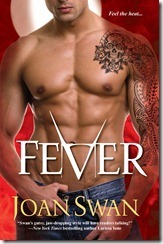 Joan Swan is a triple RWA® Golden Heart finalist and writes sexy romantic suspense with a paranormal twist. Her debut novel with Kensington Brava, FEVER, released February 28, 2012. Her second novel, BLAZE, follows in October,2012.
Joan Swan is a triple RWA® Golden Heart finalist and writes sexy romantic suspense with a paranormal twist. Her debut novel with Kensington Brava, FEVER, released February 28, 2012. Her second novel, BLAZE, follows in October,2012.
In her day job, she works as a sonographer for one of the top ten medical facilities in the nation and lives on the California central coast in beautiful wine country with her husband and two daughters.
February 28, 2012
Radio Interviews
by Elizabeth S. Craig, @elizabethscraig
[image error]Yesterday morning, I had a great phone interview with writer and radio show host Sharon Vander Meer on KFUN in New Mexico, where I was a call-in guest. Basically, with a call-in spot on a radio show, you're given a set time to call and a special number to phone in on. Or, sometimes, the station calls you.
I seem to have this sort of Radio Interview Curse. Apparently, I must have at least one of my children in the house when I'm on the radio. :) It's either summer vacation, a snow day where school is canceled, or else….like yesterday…I've got a child home, sick.
Here's a tip for parents who do interviews while the kids are home: explain everything. Explain that a radio interview means that you will be on the phone (that was a source of some confusion in years past), that they only need to interrupt you if it's a true emergency (and clarify what a true emergency is), and explain that if the dog starts unexpectedly barking, to put her out in the backyard. Trust me. It's better to be over-prepared. Put a sticky note on your closed door to remind them you're on the radio/on the phone…they'll forget.
I've also done an in-person radio interview. In some ways, the in-person radio interview was easier. On the phone, I'm always listening hard for any clues that I need to shush up and move on to the next subject. When you're face to face with your radio interviewer, you get visual clues to wrap up a particular train of thought. (Hurry up motions).
A few tips for doing radio:
Use your land line and don't use your speaker phone or a headset.
Turn call-waiting off
Know the station's call letters and use them in the interview.
Make sure you know the demographic for the station.
Have water nearby.
Jot down your interviewer's name and use it. Silence your cell phone.
Make notes for yourself—even with your website info in case you suddenly draw a complete blank under pressure.
Be prepared to sum up your book in a couple of sentences.
Know how long the interview will last so your answers won't be too long or too short.
Sharon was kind enough to send me some questions in advance, which really does make life easier. The interview went really well…and there were no interruptions from my daughter, who's happily now on the mend.
Have you done radio or podcast interviews? Have any other tips?
February 26, 2012
Tips for Writer's Conferences
by Elizabeth S. Craig, @elizabethscraig
 Although it's tough for me to get away, I really enjoy going to writer's conferences. I love the chance to see other writers in person, since most of my interaction is online.
Although it's tough for me to get away, I really enjoy going to writer's conferences. I love the chance to see other writers in person, since most of my interaction is online.
Saturday, I went to the Book 'Em conference in Lumberton, NC. It was a great event--well-organized and well-attended.
Benefits of conferences:
Meeting readers and meeting other writers.
Meeting formerly-virtual friends. I loved meeting L. Diane Wolfe, who I've known for years online…it was wonderful to finally meet her in person. (And she's just as fun, vibrant, energetic, genuine, and nice as she seems online. Thanks to Diane's husband for taking this picture of us.)
Informative panels: I hear interesting perspectives on the publishing industry and the writing craft when I go to conferences.
Connecting with industry professionals: Some writing conferences can be good places for unpublished writers to find agents and publishers. (Usually the larger ones…and you'll need to make a reservation in advance for a formal pitch session.)
Remember:
Bring business cards. Because you'll need them. (I forgot mine. Sigh.)
If you're published, know in advance how the book sales will be handled. Should you bring your own books? Will the venue be ordering books? Will you be handling the sales, yourself (in which case you need to bring change) or will there be a bookstore handling them?
Keep your receipts for tax write-offs.
Bring water with you if you're on a panel.
Pick your conferences carefully. Getting to conferences can be expensive, so I'd recommend finding conferences that are a good fit for what you write and aren't too far away, geographically.
Pace yourself. And wear comfortable shoes.
Have you been to any conferences? What tips can you add?
February 25, 2012
Twitterific
by Elizabeth S. Craig, @elizabethscraig
Below are the writing-related links I tweeted last week.
The free Writer's Knowledge Base search engine, designed by software engineer and writer Mike Fleming, makes all these links (now over 14,000) searchable. The WKB recently celebrated its one-year anniversary. 
Sign up for the free monthly WKB newsletter for the web's best links and interviews:http://bit.ly/gx7hg1
7 things 1 writer has learned from Stephen King: http://bit.ly/wivL7y @victoriamixon
Go to a Workshop? No Thanks: http://bit.ly/xtAzId @geardrops
Tips for a Successful Public Presentation: http://bit.ly/yjFH6d @WriteAngleBlog
An explanation of speculative fiction: http://bit.ly/y3faKc @theskypirate
How Choreography Helps a Scene: http://bit.ly/ylBkuH @RavenRequiem13
3 Ways Authors Can Use Pinterest Guilt Free: http://bit.ly/zF2UE2
Crime fiction--ethical considerations for PIs regarding romance: http://bit.ly/ySVcQq @authorterryo
Tips for Writing Heart-pounding Visceral Responses: http://bit.ly/Ao2ICF @jhansenwrites
Finding the Four B's of Your Character: http://bit.ly/wpiFpw
Children's Writers: Waiting to Get Published: http://bit.ly/zoC4kt @Margo_L_Dill
All about the front matter of your ebook: http://bit.ly/A0DhbA @JFBookman
10 Steps to Writing: http://bit.ly/A2B5O5 @elspethwrites
When critique partners call you out: http://bit.ly/zD9AKT @JoshilynJackson for @junglereds
Tips for Fearless Writing: http://bit.ly/zSITqS
Are You Making Your Characters (and Yourself) Look Stupid? http://bit.ly/y1TeUE @KMWeiland
Finding Inspiration: http://bit.ly/zK4Fou
5 Promises You Make to Your Reader: http://bit.ly/ypxJQO @Diymfa
The What, Why and How of Tagging Books on Amazon: http://bit.ly/znmJuu @keligwyn
What to Do When Your Novel's Too Short: http://bit.ly/xyqQXP @janice_hardy
How to Simplify Marketing Your Book to Save Time and Make More Sales: http://bit.ly/A9mNhc
The Crucial Question You Must Ask in Your Opening Scene: http://bit.ly/xm6Xi5 @LiveWriteThrive
Mining For Character Emotions: http://bit.ly/xLaqXG @SharlaWrites
Please Don't Blog Your Book: 4 Reasons Why: http://bit.ly/yhslo3 @JaneFriedman
Deep Worldbuilding and POV Scene Preparation: http://bit.ly/zThmSV @JulietteWade
Why You Should Care About Building an Email List: http://bit.ly/Au1Jjf
Pride and Prejudice and the Three Movements in Every Love Story: http://bit.ly/wNn3Ys @write_practice
Tips for writing horror: http://bit.ly/z4oSBn @nicolebasaraba
Voices of Insecurity: http://bit.ly/y1NWOi
Quick and Easy Tips for Learning More About Your Readers: http://bit.ly/w3R3Gs
Avoid giving characters similar names: http://bit.ly/weUr6T @authorterryo
Tips for promoting in the real world (instead of virtually): http://bit.ly/y3UnRT @spunkonastick for @StephenTremp
Bloggers--learn assertiveness: http://bit.ly/zVhlWq @Rule17
Freelancers--how to boost your confidence to increase income: http://bit.ly/zPADoh @JulieBMack
Learning your writing style: http://bit.ly/x80TqV @mjcache
Bust 4 Myths to Gain More Writing Time: http://bit.ly/yBmqzp @LyndaRYoung
Stories don't need enhancements: http://bit.ly/xghX4j
"The book was great and the typos weren't very bad": http://bit.ly/y8kVqD @thefuturebook
Ebook Pricing for Short Stories and Novellas? http://bit.ly/AC9vtB @goblinwriter
Top 10 Songwriting Books: http://bit.ly/yqe1Ru
Writing Dialogue with Purpose: http://bit.ly/ylP9oI @Ava_Jae
Quitting your day job & following your writing dreams: http://bit.ly/yiAtTO @thecreativepenn for @ollinmorales
Amazon vs. Big Publishing: 800 lbs vs. 798 lbs: http://bit.ly/zvcQDj
The 3 Layers of Story Engineering, Architecture, and Art: http://bit.ly/wnpTq4 @storyfix
Is bundling ebooks with print books a good idea? http://bit.ly/zlDplq
If you don't exist on the Internet do you exist at all? http://bit.ly/zCfFjH @JenTalty
How Better Happens: http://bit.ly/z0dQCV
Making Your Readers Giggle: http://bit.ly/zJ50uT @writerashley
8 Simple Tips for Editing Your Own Work: http://bit.ly/ww9b1A
How to Recover From a Social Media Hangover: http://bit.ly/xG0Vgg @biggirlbranding
6 Ways to Beat the Blogging Blahs: http://bit.ly/zM5JsI @jodyhedlund
Learn to Love the Pitch: http://bit.ly/zI8OhX @blurbisaverb
3 Steps to Overcoming 'Almost Done' Syndrome: http://bit.ly/A7kPGt @writeitsideways
Quiet & enigmatic characters in crime fiction: http://bit.ly/yVxb0s @mkinberg
When sleuths have to step on toes (including ones in their own agency) in crime fiction: http://bit.ly/wJzn3P @mkinberg
5 Google+ Profile Mistakes to Fix: http://bit.ly/xubfAI @galleycat
6 Guest Post Tactics: http://bit.ly/zD9X2V @tomewer
A Quiz on Parenthetical Punctuation: http://bit.ly/xs3rto
How to Use the "Save the Cat" Beat Sheet for Revisions: http://bit.ly/AtumCy @jamigold
5 Tips for Great Series Titles: http://bit.ly/wpmxX1
Writer Beware on Publishers' Desk: http://bit.ly/z9XB31 @victoriastrauss
On Being A Professional Songwriter: http://bit.ly/xpxbqN @usasong
Is Perfectionism Stalling Your Productivity? http://bit.ly/zvDeNn @problogger
How to be creative: http://bit.ly/ymZTBV @justinemusk
Super Powers: 6 Things To Consider Before You Write Them In: http://bit.ly/x7odix @ajackwriting
Breaking Grammar Rules: Sentence Fragments: http://bit.ly/zpgLEf
Is your antagonist a problem and not a person? http://bit.ly/AoJqdr @janice_hardy
5 top tools for promoting your book on Twitter: http://bit.ly/w20kgo @Rule17 for @JFBookman
10 Questions to Ask Before Committing to Any E-Publishing Service: http://bit.ly/yO0juk @janefriedman
When It's Time to Say Goodbye to Your Manuscript: http://bit.ly/wAurfz
What Indie Production Actually Costs: http://bit.ly/xWPBNb @deanwesleysmith
Promoting Your YA Novel: http://bit.ly/wMXnn4 @Kristi_Cook
How to Draw Your Characters Out: http://bit.ly/yrDToZ @write_practice
5 basic elements of every good story: http://bit.ly/xRGbH0
Polyglot vs. Translator: Different Takes on Multilingualism: http://bit.ly/zYkZ1M @michaelerard
A Tale of Two Ebooks: http://bit.ly/yOtqVB @AlexisGrant for @Problogger
Writing in the Digital Age: Connecting with Readers: The Stephen King Problem: http://bit.ly/wUP3LC @KellyMcClymer
A refresher--subjunctive mood: http://bit.ly/zLM9f0 @readingape
Better Procrastination as a Writer: http://bit.ly/Agr1Mk
Screenwriting: Is the audience listening to your dialogue? http://bit.ly/x88BrM @jacobkrueger
5 Myths About eBooks Debunked: http://bit.ly/A6dffb @ebooknewser
Why Page Length for YA or MG Novel Is The Wrong Question: http://bit.ly/yzF22C
Fantasy writers--have a Magic System: http://bit.ly/xUMSlR @thomasaknight
Why Hating Facebook Is Costing You Book Sales: http://bit.ly/wmWu3S @bubblecow
Dealing with Difficult Blog Visitors: http://bit.ly/wdXMwV @annerallen
Are We Grounded? Setting the Scene and Engaging the Reader: http://bit.ly/z3BXrE @janice_hardy
Transform Your Writing Weakness into Strength: http://bit.ly/yycykd @angelaackerman
Revise and Present: updating your ebook: http://bit.ly/A8r3v4
90 Verbs Starting with "Ex-": http://bit.ly/w0vxRZ @writing_tips
Every Writer's Lament: http://bit.ly/wZ7QrB @bookemdonna
Are you waiting too long to market your book? http://bit.ly/wYs4sB @WiseLouise
When writing, the trick is to breathe: http://bit.ly/yjJ96d @jcbaggott
Tips for developing writing voice: http://bit.ly/z2sncY @rebeccaberto
Creating the image arc for your book: http://bit.ly/A3Qy4J
21 Ways to Kill Your Creativity: http://bit.ly/yusYv2 @MichaelMichalko
6 Tips On Writing Plays For Kids: http://bit.ly/ximofT @chucksambuchino
Eliminating Unnecessary Plot Complications: http://bit.ly/xafmBJ
Key Story Elements: Lessons from Musical Theater: http://bit.ly/yegbTF @AlexSokoloff
Should you publish your novel to build your platform? http://bit.ly/xJeRQo @dirtywhitecandy
A Writer's Guide to Punctuation: http://bit.ly/zx9xCN @KMWeiland
A Quiz on Expletives: http://bit.ly/xmuifq @writing_tips
Smart & savvy look at industry news from the past week (including Amazon's latest dirty deeds): http://bit.ly/yeFB5f @Porter_Anderson
Writing on the Ether features @jimchines @DonLinn @paulkbiba @nicovreeland @annerallen @LloydJassin @jasonashlock http://bit.ly/yeFB5f
The rescue motif in crime fiction: http://bit.ly/w2bWLt @mkinberg
The prodigal's return theme in crime fiction: http://bit.ly/yJSWoM @mkinberg
Author blogging--linking for traffic: http://bit.ly/zVF3R7 @JFBookman
Twitter etiquette - careful with DMs: http://bit.ly/Az37jb @nicolamorgan
Transitions and Chapter Breaks: http://bit.ly/yJpOYU
What the Publishing Industry Can Learn From Kodak: http://bit.ly/AAQgcm @rachellegardner
Finding Extraordinary Writing in an Ordinary Life: http://bit.ly/Amls4o @writeitsideways
Afraid to Publish Your Work? Here's the Solution: http://bit.ly/AdgDLJ @jeffgoins
Making the Most of Your Writing Time: http://bit.ly/y377Wp @calistataylor
Tips for writing slice-of-life essays: http://bit.ly/wawxQI
7 Essential Tips for WordPress Bloggers: http://bit.ly/AA6pem
An agent on choosing a genre: http://bit.ly/xpLZ9x @bookendsjessica
Figuring out Your Character's True Desire: http://bit.ly/zxUkSj @katieganshert
Do you have a creative block? Do you know what you're trying to accomplish? http://bit.ly/xR0ZtN @tannerc
The role of dystopian fiction in a changing world: http://bit.ly/wslPWE
Why Consistency Isn't Always A Good Thing: http://bit.ly/yjTZkC @ollinmorales
The Aesthetics of Good and Evil in David Copperfield: http://bit.ly/wsoPKE @write_practice
5 writing myths: http://bit.ly/xz7432 @ava_jae
4 Tools to Make Writers More Productive: http://bit.ly/y8May6 @HowToWriteShop
Mixed Feelings About Pinterest: The Latest Shiny New Thing: http://bit.ly/AEC4pZ @NicholeBernier
Who should take the blame for the publishing industry's troubles? http://bit.ly/y5Tk0z
Using Kickstarter to Fund Self-Publishing Projects: http://bit.ly/zh8IXv @goblinwriter
Focus and the Distracted Writer: http://bit.ly/zhaYKJ
10 Experts Take on the Writer's Rulebook: http://bit.ly/z1UacV @writersdigest
The Writer's Ear: Hearing Prose, Poetry and Music: http://bit.ly/xSQ9OG @JomCarroll for @WomenWriters
Do You Really Need to Write Every Day? http://bit.ly/yyOify @writersdigest
10 Ways To Get More Facebook Fans This Week: http://bit.ly/A2dICt @authormedia
Tips for becoming an editor: http://bit.ly/ybTjly @noveleditor
Why Foreign Rights are a Big Deal for Small Publishers: http://bit.ly/wlRqbB @pubperspectives
Fixing the holes in our manuscripts: http://bit.ly/zhpjkv
How to Use Anger to Fuel Your Writing (In a Positive Way): http://bit.ly/wrz7FJ @krissybrady
If we didn't procrastinate, we'd never accomplish anything: http://bit.ly/zpqqTk @misfitsmascara
Out Of My Comfort Zone: Exposing the Dark Questions: http://bit.ly/wuVxmp @BTMargins
How to Find Your Writing Voice: http://bit.ly/zApQZ4 @JulieBMack
The Life Cycle of Twitter: http://bit.ly/wzpWRS @JulietteWade
Do you know your customer? http://bit.ly/ymotKi @rachellegardner
Adult vs YA dystopias - A Question of Hope: http://bit.ly/z6RQTB @Lenoreva
25 Subordinating Conjunctions: http://bit.ly/yTlrKG @writing_tips
Zealotry in Fiction: http://bit.ly/xbCt5y @fantasyfaction
February 24, 2012
Writerly Insecurity & Pushing Ourselves Out of Comfort Zones
by Elizabeth S. Craig, @elizabethscraig
 Last weekend, I was in South Carolina for the Festival of the Arts in the town of Anderson.
Last weekend, I was in South Carolina for the Festival of the Arts in the town of Anderson.
I'm originally from Anderson and Jane, one of the event organizers, called me last fall and invited me to attend. She explained that it wasn't a signing or speaking gig, but more of an exhibit. The artists would be there to talk to attendees about their creative process, etc.
The word "artist" gave me pause, although I frequently use it in reference to writers. This time, though…. "Who is going to be there?" I asked.
"Sculptors, painters, photographers, quilters, woodworkers…" The list went on.
I wasn't sure. "I'm going to be the only writer there?"
That was correct.
I agreed to go, but remember feeling…well, a little insecure about it. Those other artists are artists! In every way.
Time went by until about two weeks ago and the organizer called me again. "I'm in the process of setting up the tables for the event and wanted to go ahead and plan your exhibit. What kinds of things would you like to bring in?"
I paused. "What are the other artists bringing in?"
"Photography, maybe some woodwork they're working on or a current canvas they're in the process of painting."
I said, "Jane, all my stuff is going to look like clutter! In fact, it is clutter. It's notebooks and Post-Its and scribbles. The stuff in the notebooks is going to sound absolutely crazy. Besides, most of the writing I do is on my laptop and that's not going to be very interesting."
But she convinced me to send along what I had. I put together some of my books, some of my printed rough drafts that I'd marked up with revisions, an ARC of one of my books, and a few notebooks for past projects that had sticky notes scattered throughout and cryptic notes to myself.
And it was clutter! Mine is the center, yellow table in the picture. Jane arranged it as best she could, but there's only so much you can do with clutter. :)
When I got to the festival last Saturday, I learned that I wasn't the only attendee to have second thoughts or doubts. Jane told me that a large number of the artists she'd called had told her that they didn't consider what they did art. Some did consider their creative efforts art, but they didn't think it was good enough to display. Some were uncomfortable with anyone viewing their art, stating it had really just been done to please themselves.
I'm fairly confident about some aspects of my writing now. I'm confident I can finish a book. I'm confident I can deliver what my editors are looking for (or, if not, that I can tweak it to make it work.) I'm confident that I can fix whatever disaster of a first draft that I write.
But this just serves as a reminder that we're never really over feeling insecure about what we do, especially in comparison to others' efforts. And that apparently is true for other areas of the artistic community, too.
Once the exhibition started, though, I think all the artists forgot their self-consciousness. That's because our audience came in. And they were eager to see what we were doing, ask questions, and enjoy what we'd created.
This makes me think that if we think less about what other artists or writers are accomplishing, less about our own fragile egos, and look toward our readers, we might have a shot of getting past our insecurities.
How do you step outside your comfort zone as a writer? How do you battle insecurities?
I'll be traveling again tomorrow, this time to the Book 'Em Conference in Lumberton, NC. I'm speaking on a panel at 2:00 there with my writing friend L. Diane Wolfe. Hope you'll come if you're in the area. http://www.bookemnc.org/
February 21, 2012
Eliminating Unnecessary Plot Complications
by Elizabeth S. Craig, @elizabethscraig
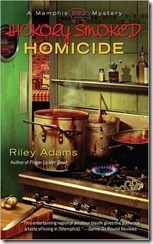 Penguin has asked me to write a fourth Memphis Barbeque book. It was great to hear that I'd have a reason to spend more time with the characters in that series.
Penguin has asked me to write a fourth Memphis Barbeque book. It was great to hear that I'd have a reason to spend more time with the characters in that series.
I also had an idea for something I wanted to do with the plot—I wanted to feature the huge Memphis in May festival that's such a big event there every year.
My protagonist and sleuth for the series is Lulu Taylor, who owns a barbeque restaurant. I decided to make Lulu a judge for the event. There are many different foods to judge at the festival—everything from slaw to sauce to the barbeque itself.
I got deeper into the research on being a food judge. I realized there were different rules these judges have to follow to keep the competition fair. I saw that there was a good deal of training that went into being one. I felt, also, that this would be something I'd need to make sure I represented well in the book, since there are people in Memphis who read this series…and I wanted my information to be correct and not something that I changed for my own purposes.
I could also tell that Lulu would be kept very busy as a judge.
As I got farther into the book (this is one that I'm working on now), I realized I was making this mystery unnecessarily complex. And confusing. And, really, having Lulu be a judge was going to tie up a lot of her time and make her less available to investigate a murder.
This wasn't a book about judging barbeque competitions. This was a mystery. And my sleuth needed to solve the mystery, not pick the top baked bean winner.
These were some of the questions I asked myself before I decided to demote Lulu from judgeship:
Does this forward the plot? Is it necessary?
Am I including research simply to show off how well I've researched?
Will this complication confuse readers?
Are there other, simpler ways to accomplish the same effect?
What's the basic reason I'm including this complication in the book?
For me, I decided the whole point I'd made Lulu a judge was to put her on the scene at Memphis in May. But wouldn't she already be there? Her best friends have a booth at the festival. It's the biggest Memphis event of the year. And Lulu has two grandchildren begging for her to take them there.
Why wouldn't she be there? The whole complication of Lulu being a judge just wasn't needed. It only made the plot more convoluted for readers and tougher for me to write. And required a great deal of research.
Do you ever notice, like me, that you're making things complicated for both yourself and your readers? How do you simplify unnecessarily convoluted plotlines?

